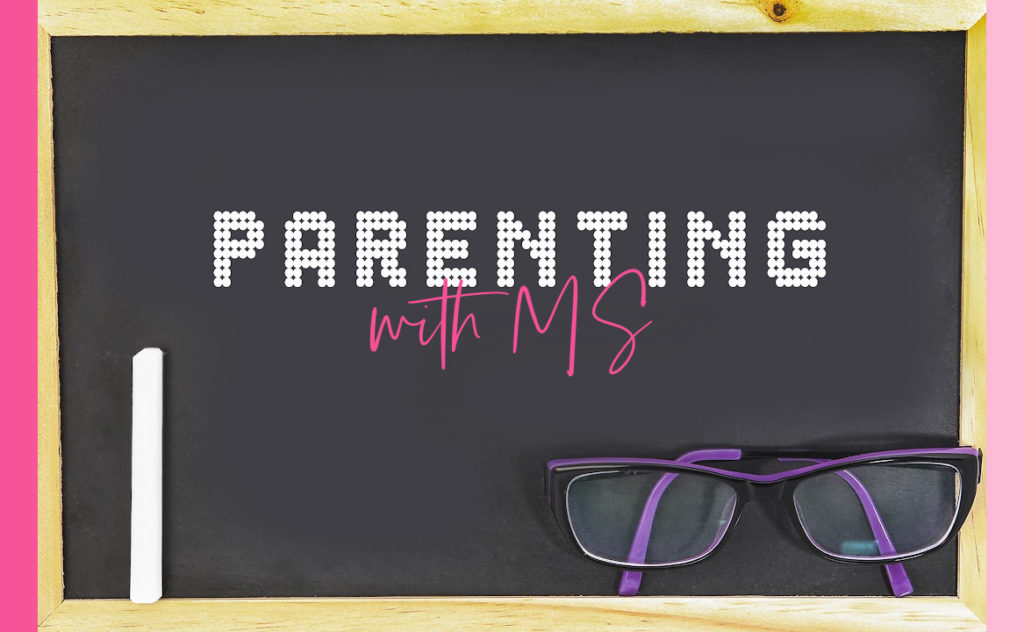Parenting And MS: From Stigma To Super Powers

Parenting with MS: Saying No To Stigma And Ableist Attitudes
When I was diagnosed with MS, it was four years before someone on my medical team volunteered any information about pregnancy and MS. I was in my late twenties when a bladder-and-bowel nurse specialist casually told me not to have kids.
My first reaction was, whatever, I don’t want kids anyway. My second thought was, how dare you, I’d be a great fucking mom. I knew enough about MS, and about my MS in particular, to know that it would have been safe and reasonable for me to have considered motherhood at that time.
MS Doesn’t Mean You Can’t Be A Great Parent
Okay, so I just googled ‘what makes a great mom’ and the interwebs came back with qualities like patience, selflessness, and empathy; so fine, maybe I wouldn’t have made a great mom, but I would have made a decent mom. I know how to work a microwave, and that running with scissors is bad. I don’t know CPR, but I’m pretty sure I could google it. The point is that none of my internet deep-dive came back with anything to suggest that great parents must be able to climb stairs, maintain fully functioning bladders, or be in possession of intact myelin sheaths. That know-it-all nurse had no idea how much I swear, or how much me time I require (all of it). She dropped a potential bombshell when all she knew about me was that I had MS.
Maybe Nurse Know-It-All had been concerned about how a pregnancy might impact my MS and/or bladder issues; in which case, she could have said, here’s how a pregnancy might impact your MS and/or bladder issues. If you are interested in having children, these are the things we can do to mitigate these concerns.
But she didn’t say that. She didn’t say anything, and I was left to wonder if she thought my body couldn’t handle a pregnancy or if she thought I couldn’t handle parenthood. Was Nurse Know-It-All concerned about me or was she worried about my theoretical offspring?
The reality is that some people don’t think people with disabilities should have kids at all.
Fortunately, not everyone with MS faces this kind of medical gaslighting. MS on its own should not prevent you from procreating if that’s your jam. But many Trippers do have to contend with a degree of ableism and even internalized ableism when it comes to parenting with MS.
Ableism and Parenting with MS
When my child-free girlfriends started being questioned about when they were going to pop one out, I realized that the singular time I was ever given this kind of verbal shakedown was at a party where a man I only knew casually tried to talk me into motherhood by insisting that, “You haven’t lived until you’ve had children.” Never mind that I’d traveled the world, studied voice in France, or that I once met Martin Short. I felt certain that if this pregnancy-pushing rando had known about my MS he never would have encouraged me to procreate. He probably would have approached me with a degree of pity, assuming that my barren womb was because of MS and not because kids are sticky, loud, annoying, and gross. (I mean, except for my nieces, nephews, and godchildren. You guys are great!)

When I asked Trippers about their own paths to parenthood, I received some heartbreaking responses. Jodi J had a friend ask her, “Why would you want to bring a baby into the world, knowing you will eventually be disabled?”
A second ‘Fuck You’ for at least six reasons, to whoever said this to Jodi. It might seem reasonable to try to shrug these comments off; I mean, who cares what anyone else thinks. But there can be real-life consequences when other people decide that you are not a competent caregiver.
The pressure to be the perfect parent is ubiquitous and every parent has to contend with their own limitations. People with MS may need to consider how medications impact pregnancy and breastfeeding, or how to negotiate fatigue when parenting can be exhausting. Yes, pregnancy might fuck up your already fucked up bladder, but the overwhelming feedback from parents with MS, is that it’s worth it. For many people having a family is an essential part of the human experience. We need to ensure that moms and dads with MS are supported at every point of the parenting process so that MS doesn’t steal one more life experience from you.
From micro-aggressions to super-powers, I wanted to dig deeper into parenting with chronic illness and/or disability. I was delighted when Rebekah Taussig, the brilliant and wise author of Sitting Pretty, agreed to be on this months’ podcast. If you’re a parent with MS or if you’re thinking about becoming one, you do not want to miss this episode!

Follow Tripping On Air on Insta, Facebook, YouTube, Twitter.

 Back to
Back to
Such a great article and podcast! Thank you! It spoke so much truth.
I was diagnosed after our children (both adults now) were born. I have been asked if I would have had them had I known ms was in my future. Really?!! Good grief.
I too was diagnosed (2005)after my children were born. They were 3 and 6 when I was first diagnosed. I was lucky to be able to be active when they were young and am so thankful for those years. I don’t know what we would do without our kids. Would I change things? Maybe, had I been diagnosed prior to having kids we wouldn’t have decided to have kids?
But…They have brought so many happy times and memories to our lives and THAT I am thankful for despite that my MS has progressed.
Life is a roll of the dice and you just never know how they’re going to land.
Life is a gamble and so is MS.
Wow
This was a great podcast I had already had 2 kids before I was diagnosed with MS about 6 months after my 2nd child it all started to happen.
I never really looked for a book about parenting with a disability, was busy reading books about first diagnosed, makes me think maybe looking at writing a book about my parenting experience with my disability. We are not all the same but maybe it would help other make their on decion then having people make it for them.
Lynda
We need these books! If you’re up for it, there are lots of people who need to hear these stories. Thanks for listening and sharing your own experience, Lynda.
I am torn because I am a child of a parent who had MS. It can be traumatic for a child to see a parent struggle with mobility issues. Experts used to say that there wasn’t a genetic component to the disease, but we now know that it does tend to run in families. I worry that I might have passed on the gene to my own children. I thought that I was past the risk of the age of onset but that number has changed. I wanted to add these considerations so that people can make informed decisions. I believe that with healthy habits people can survive a lot longer and provide excellent parenting, but we also need to be aware of the long term risks. In fact, I had a larger family as I wouldn’t want to burden a single child with the responsibility of my health care in their future.
I decided a while back that I wouldn’t have kids. As a male, I wouldn’t have to go through the trials and tribulations of pregnancy followed by childbirth. I would only experience the pleasures before and after.
But my parents had diabetes. So do I. The thought of passing on my flawed genes (along with the possibility of MS having a genetic aspect), aroused my paternal instinct to protect my hypothetical children from harm. My paternal instinct made me decide not to father children.
I was dx 40 years ago… denied, just denied it ~ because I kinda could, I could walk, swim, lift up, balance, drink, think fatigue was just tired…except I listened (hippy days of earthy stuff) and actually took my linoleic (so?) acid? Weird right?
For years.
One year after my diagnosis, I partied with drugs and booze, lost three days, it was New Years!
A few months later found out I was pregnant.
First call- my neurologist. Dr. Neurologist said, “That’s great if you want a child, you will probably be just fine, but remember, the hard part is not pregnancy, but having a child with M.S.”….
He was right for sure…but had two pregnancies and never felt better, no M.S. symptoms, I thought it was gone cured?
I was never gone. I have had symptoms for all these years. All these years is pretty good.
Now, older, aging with M.S. is a newer concern, the symptoms overlap with aging conditions nobody knows who or what to blame…they (medical professionals) tend to not look you in the eye, and don’t diagnose anything. My experience ~ and this could be my local area…there is a lack of testing or sticking their necks out for us old M.S.ers. It is so weird to be so dismissed.